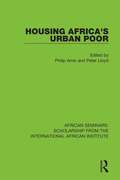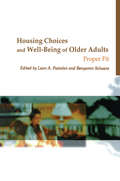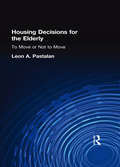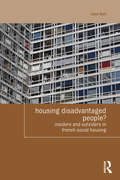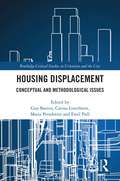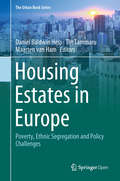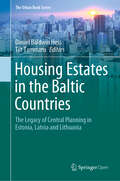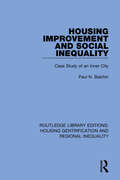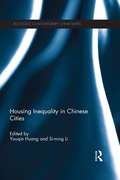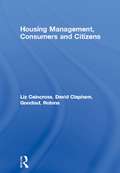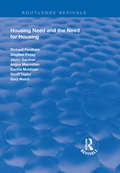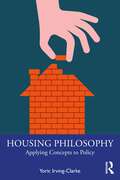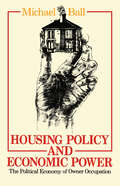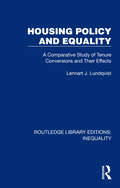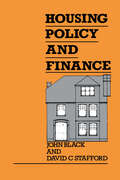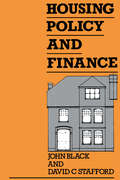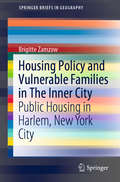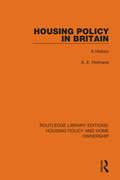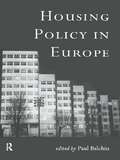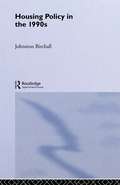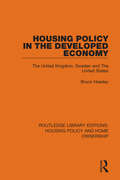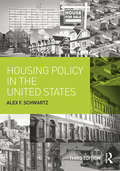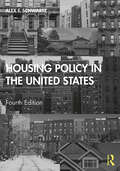- Table View
- List View
Housing Africa's Urban Poor (African Seminars: Scholarship from the International African Institute #2)
by Peter Lloyd Philip AmisOriginally published in 1990, this book reveals the extent to which petty landlordism is developing not just in the African urban settlements that have sprung up but in government-sponsored low-cost housing estates. The first part of the book traces African governments' changing responses to urban growth since the 1960s. The second presents case studies of housing markets and landlord-tenant relations north and south of the Sahara. The third examines World Bank involvement, and the book ends by considering policy implications.
Housing Choices and Well-Being of Older Adults: Proper Fit
by Benyamin Schwarz Leon A PastalanMake housing for the elderly comfortable, efficient, and appropriate to their special needs!Today people are living longer lives than ever before, and elderly people need to live in settings that reflect their individual capabilities. They need safe and appropriate homes, appliances, and furnishings that they will not lose the ability to use and enjoy in the years of decline. Housing Choices and Well-Being of Older Adults: Proper Fit addresses the challenge of matching the attributes of residential settings for older adults with the competence of the people who live in them. This book views housing for the elderly as a special case in terms of the person-environment paradigm. It highlights the recurring themes that give housing for the elderly a measure of order and predictability.Care providers, consultants for retirement communities, researchers in the fields of aging and environment or gerontology, university libraries, and members of housing associations for the elderly will benefit from the timely and vital information in this book. Easy-to-understand charts and tables make the information even more accessible.Housing Choices and Well-Being of Older Adults discusses: the state of theory development in environmental gerontology housing needs of the elderly quality issues in this type of setting design and development issues kitchen, bathroom, and bedroom applications for elderly people in various states of health home safety issues and much more!and the issues surrounding continued aging and its implications for: supportive environmental, health, and psychosocial services the economic and financial concerns of aging adults housing management and community issuesUse what you'll find in Housing Choices and Well-being of Older Adults to ensure that the elderly people in your life are comfortable in an environment that is safe and appropriate.
Housing Decisions for the Elderly: To Move or Not to Move
by Leon A PastalanBecause many elderly wish to age in place, they typically give little thought to the future of their housing options. Housing Decisions for the Elderly articulates the relevant issues regarding the diversity and complexity of housing decisions in terms of moving or not moving.To move or not to move is really part of the aging-in-place debate. In this guidebook, the authors deal with such issues as changes in economic income and stances; changes in household composition and health; and the psychosocial and metaphysical significance of “house.”This treatment of housing decisions regarding aging in place serves to assist professionals and laypersons to help the elderly make more informed choices and to plan better for the future. Housing Decisions for the Elderly reminds those who work with elderly persons--community organization workers; housing counselors and specialists; home health care agencies; and gerontologists--that the proportion of persons living in family settings decreases with age, so that the older the person, the more likely he or she will be living above or with nonrelatives in institutional or quasi-institutional settings.While changes in household composition typically occur at one or more points in the aging process such as death of spouse, incapacitating illness or loss of income, other housing issues to consider are addressed:why socioeconomic determinants of housing decisions of elderly homeowners focuses primarily on housing characteristics (owning vs. renting), length of housing tenure, age, and support from relatives how elderly housing assistance programs affect housing tenure deals with age as the single most important factor factors that influence pre-retiree’s propensity to move at retirement access to health care, freedom from house maintenance, and supportive services as the main determinants of moving to a continuing care retirement community
Housing Disadvantaged People?: Insiders and Outsiders in French Social Housing (Housing and Society Series)
by Jane BallSocial housing appears to offer a solution for the housing of poor and disadvantaged people. The French "right to housing" offers poor and disadvantaged citizens priority in social housing allocation, and even a legal action against the State to obtain a social home. Despite this, France is suffering a long-lasting housing crisis with disadvantaged people having particular difficulties of access, often despite the efforts of local housing actors. This situation is affected by the European Court of Human Rights and EU decisions limiting diverse national housing and rental policies. Between historic French revolutions and the modern riots, negotiated solutions to social dilemmas emerged. Despite progress in constitutional principles, complex local negotiations still ultimately determine who is housed. Local social landlords, mayors and employee and tenant representatives use their privileges to house their insiders: existing tenants, locals and employees, with rent insufficiently subsidized. ‘Insider Outsider’ theory is used for an economic analysis of exclusion in social housing allocation: its processes, institutional context, and stigmatizing effects. This highlights the spatial effects of nimbyism, excluding disadvantaged outsiders, and concentrating them in deprived areas. Simultaneously, urban regeneration reduced affordable housing stock and ‘social mix’ became a reason to refuse a social home. History, comparative law, economic theory and local interviews with housing actors give a detailed picture of what happens in and around French social housing allocation for an interdisciplinary housing policy audience. Constitutional principles appear in an unfamiliar guise as negotiating positions, with the "right to property" supporting landlords and the "right to housing" supporting tenants. French debates about the function of social landlords are echoed across Europe and reflected in European policies concerning rights, and the exclusion of disadvantaged minorities.
Housing Displacement: Conceptual and Methodological Issue (Routledge Critical Studies in Urbanism and the City)
by Guy BaetenThis book examines reasons, processes, and consequences of housing displacement in different geographical contexts. It explores displacement as a prime act of housing injustice – a central issue in urban injustices. With international case studies from the US, the UK, Australia, Canada, India, Spain, Denmark, Sweden, and Hungary, this book explores how housing displacement processes are more diverse and mutate into more new forms than have been acknowledged in the literature. It emphasizes a need to look beyond the existing rich gentrification literature to give primacy to researching processes of displacement to understand the socio-spatial change in the city. Although it is empirically and methodologically demanding for several reasons, studying displacement highlights gentrification’s unjust nature as well as the unjust housing policies in cities and neighborhoods that are simply not undergoing gentrification. The book also demonstrates how expulsion, though under-researched, has become a vital component of contemporary advanced capitalism, and how a focus on gentrification has hindered a potential focus on its flipside of ‘displacement’, as well as the study of the occurrence of poor cleansing from a long-term historical perspective. This book offers interdisciplinary perspectives on housing displacement to academics and researchers in the fields of urban studies, housing, citizenship, and migration studies, interested in housing policies and governance practices at the urban scale.
Housing Estates in Europe: Poverty, Ethnic Segregation And Policy Challenges (The Urban Book Series)
by Daniel Baldwin Hess Maarten Van Ham Tiit TammaruThis open access book explores the formation and socio-spatial trajectories of large housing estates in Europe. Are these estates clustered or scattered? Which social groups originally had access to residential space in housing estates? What is the size, scale and geography of housing estates, their architectural and built environment composition, services and neighbourhood amenities, and metropolitan connectivity? How do housing estates contribute to the urban mosaic of neighborhoods by ethnic and socio-economic status? What types of policies and planning initiatives have been implemented in order to prevent the social downgrading of housing estates?The collection of chapters in this book addresses these questions from a new perspective previously unexplored in scholarly literature. The social aspects of housing estates are thoroughly investigated (including socio-demographic and economic characteristics of current and past inhabitants; ethnicity and segregation patterns; population dynamics; etc.), and the physical composition of housing estates is described in significant detail (including building materials; building form; architectural and landscape design; built environment characteristics; etc.). This book is timely because the recent global economic crisis and Europe’s immigration crisis demand a thorough investigation of the role large housing estates play in poverty and ethnic concentration. Through case studies of housing estates in 14 European centers, the book also identifies policy measures that have been used to address challenges in housing estates throughout Europe.
Housing Estates in the Baltic Countries: The Legacy of Central Planning in Estonia, Latvia and Lithuania (The Urban Book Series)
by Daniel Baldwin Hess Tiit TammaruThis open access book focuses on the formation and later socio-spatial trajectories of large housing estates in the Baltic countries—Estonia, Latvia, and Lithuania. It also explores claims that a distinctly “westward-looking orientation” in their design produced housing estates that were superior in design to those produced elsewhere in the Soviet Union (between 1944 and 1991, Estonia was a member republic of the USSR). The first two parts of the book provide contextual material to help readers understand the vision behind housing estates in Estonia, Latvia, and Lithuania. These sections present the background of housing estates in the Baltic Republics as well as challenges and debates concerning their formation, evolution, and present condition and importance. Subsequent parts of the book consist of:demographic analyses of the socioeconomic characteristics and ethnicity of housing estate residents (past and present) in the three Baltic capital cities, case studies of people and places related to housing estates in the Baltic countries, and chapters exploring relevant special topics and themes.This book will be of interest to students, scholars, and advocates interested in understanding the past, present, and future importance of housing estates in the Baltic countries.
Housing Improvement and Social Inequality: Case Study of an Inner City
by Paul N. BalchinOriginally published in 1979, this book discusses housing improvement, and particularly its effects upon the residential population of the inner areas of West London. The economic and social rationale is explained, and the role of landlords, developers and local authorities is analysed. The book concentrates both on the defects of the improvement process as a whole, and on the application of housing legislation within a specific geographical area. Housing improvement is related to the debate about the inequality of wealth by implicitly questioning who benefits and who loses from improvement policy.
Housing Inequality in Chinese Cities: Housing Inequality In Chinese Cities (Routledge Contemporary China Series)
by Youqin Huang Si-Ming LiIn recent decades, Chinese cities have experienced profound social, economic and spatial transformations. In particular, Chinese cities have witnessed the largest housing boom in history and unprecedented housing privatization. China now is a country of homeowners, with more than 70 per cent of urban residents owning homes, higher than many developed countries. This book shows how China’s spectacular housing success is not shared by all social groups, with rapidly rising housing inequality, and residential segregation increasingly prevalent in previously homogeneous Chinese cities. It focuses on the two extremes of the residential landscape, and reveals the stark contrast between low-income households who live in shacks in so-called ‘urban villages’ and the nouveaux riches who live in exclusive gated villa communities. Over four parts, the contributors look at the degree to which inequality affects Chinese cities, and the extent of residential differentiation; housing for the urban poor, and in particular, housing for migrants from rural China; housing for the rapidly expanding Chinese middle class and the new rich; and finally, governance in residential neighbourhoods. Housing Inequality in Chinese Cities presents theoretically informed and empirically grounded research into the polarized residential landscape in Chinese cities, and as such will be of great interest to students and scholars of Chinese studies, urban geography, urban sociology, and urban studies.
Housing Management, Consumers and Citizens
by David Clapham Liz Caincross Robina GoodladTenant participation has grown substantially over the last decade, following government legislation, advice from professional bodies and development agencies, and promotion by all major political parties. On few housing issues is there such concensus. Yet, in practice, it is obvious that participation can mean very different things in different contexts.This book explains why this is the case, and examines the growth of participation in the context of changes in the role of local authorities and their relationship with their electorates. These issues are examined in the first part of the book, which sets the context for exploring the roles of housing managers, councillors, tenants and tenant's associations in the second part. The book argues that the rise in arrangements for tenant participation masks considerable differences in the role played by tenants in different areas. These differences raise questions about the nature of power in the tenant-landlord relationship and more generally in the relationship between local government, citizens and consumers. These issues are examined in the final, third, part of the book.
Housing Need and the Need for Housing (Routledge Revivals)
by Geoff Taylor Richard Fordham Stephen Finlay Justin Gardener Angus Macmillan Cecilia Muldoon Gary WelchFirst published in 1998, this book addresses a central issue in housing: that of ‘need’ and how to meet it. Need refers either to individual household circumstances or to the aggregate requirement for new (social and market) housing. The book develops a new policy mechanism to address the present fragmented policy situation. The mechanism now used to allocate finance and new social housing numbers is complex and ineffective in terms of meeting needs. The book’s proposals are rooted in clear definitions of the key terms, especially that of housing need, which suffers from lack of any clear definition. The analysis is developed using a large database of survey information covering England and Wales. The proposed policy mechanism should be of great interest at a time when radical change to local government are being considered. The proposed mechanism would greatly increase value for money of public time and expenditure on (planning for) social housing.
Housing Philosophy: Applying Concepts to Policy
by Yoric Irving-ClarkeThis book addresses key issues in housing policy through the lens of the philosophical concepts that underpin them. It is intended to be an introduction to philosophical subjects and how they relate to key housing issues and deals with the concepts with enough rigour and depth to be of use to undergraduate and postgraduate students and teachers. Both practitioners in the housing sector and academics researching housing-related subjects often use terms such as ‘fairness’, ‘social justice’, ‘tenure’, ‘property’, ‘home’ and others as if there is a single agreed meaning for these terms. But these terms can be highly contested and there are multiple viewpoints for each of them that could change how we approach them, and how we therefore create, interpret and implement policies and procedures. This book aims to introduce certain concepts and provide guidance and stimulate thinking around how they make an impact on real-world policy. Each section opens with a relevant case study designed to highlight the philosophical concepts to be discussed and coverage ranges from homelessness to the role of government and the state, to house prices, value and property rights. This book will be of interest to students at both undergraduate and postgraduate levels, studying housing qualifications or philosophy, sociology, politics, governance and social policy – it will be of particular use for those interested in the application of philosophical concepts to a real-world policy area with clear consequences.
Housing Policies in Eastern Europe and the Soviet Union
by J. A. SillinceHousing has enjoyed a high place on the agendas of most socialist countries. However this place has not been undisputed and this book examines the internal and external forces which have influenced housing under central planning.
Housing Policy and Economic Power: The Political Economy of Owner Occupation
by Michael Ball Professor Michael BallPublished in 2002, Housing Policy and Economic Power is a valuable contribution to the field of Human Geography.
Housing Policy and Equality: A Comparative Study of Tenure Conversions and Their Effects (Routledge Library Editions: Inequality #6)
by Lennart J. LundqvistOriginally published in 1986, this book compares and evaluates the effects of converting rental housing into owner occupancy in the USA, the UK and Germany. The evaluation examines the pros and cons of such conversions. The conversion controversy is more than a technical discussion of outcomes of different housing strategies. By viewing tenure conversions as strategies for limiting direct governmental involvement, this comparative evaluation indicates something about the effects not only on housing, but on general social welfare, of such strategies.
Housing Policy and Finance
by David Stafford John BlackThis book provides a comprehensive introduction to housing policy and finance in Britain. It describes changes in the condition and tenure of housing in the post-war period, and contrasts the massive investment in house building and improvement with allegations that housing conditions are deteriorating. It describes the rise of the public housing sector and the slight decline in the face of the Thatcher government's policy on council house sales, which followed. The book thus provides a background for the development of housing policy over the next decade.
Housing Policy and Finance
by David Stafford John BlackThis book provides a comprehensive introduction to housing policy and finance in Britain. It describes changes in the condition and tenure of housing in the post-war period, and contrasts the massive investment in house building and improvement with allegations that housing conditions are deteriorating. It describes the rise of the public housing sector and the slight decline in the face of the Thatcher government's policy on council house sales, which followed. The book thus provides a background for the development of housing policy over the next decade.
Housing Policy and Vulnerable Families in The Inner City: Public Housing in Harlem, New York City (SpringerBriefs in Geography)
by Brigitte ZamzowThis book provides insights in how the lack of coherent social policy leads to the displacement of vulnerable low-income families in inner-city neighborhoods facing gentrification. First, it makes a case for how social policy by its racist setup has failed vulnerable families in the history of U.S. public housing. Second, it shows that today’s public housing transformation puts the same disadvantaged socio-economic clientele at risk, while the neighborhoods they call their homes are taken over by gentrification. It raises the powerful argument that the continuing privatization of Housing Authorities in the U.S. will likely lead to greater income diversity in formerly neglected neighborhoods, but it will happen at the expense of vulnerable families being displaced and resegregated further outside the city, if no regulatory planning measures for their protection are initiated by the government. By providing a solid empirical portrait of public housing in New York City’s Harlem, this book provides a great resource to students, academics and planners interested in gentrification with specific concern for race and class.
Housing Policy in Britain: A History
by A. E. HolmansOriginally published in 1987, this book provides a comprehensive history of housing policy in Britain from the beginning of the twentieth century to the end of the 1970s. For every period the author gives a detailed account of the housing situation in which policies operated, the policies pursued and their rationale. Owner-occupation and privately rented housing are fully discussed. Particular emphasis is placed on the financial and economic aspects of housing policy, including the impact on it of the economic situation. Issues such as population growth and the increase in the number of households are also examined.
Housing Policy in Europe
by Paul BalchinHousing Policy in Europe provides a comprehensive introduction to the economic, political and social issues of housing across the continent. The changing policy and practice of housing in fifteen countries from across Northern, Western, Southern and Central Europe are described, analyzed and compared. The book explains why different systems of tenure are dominant in different groups of countries, and the extent to which housing policies within these countries conform to different welfare systems. It reveals how owner-occupation has taken over from social housing as the chosen system of tenure and how this reflects a political and economic shift, from social democracy or communism to neo-liberalism across Europe.
Housing Policy in the 1990s
by Johnston BirchallHousing Policy in the 1990s explores the deluge of Conservative legislation of the late 1980s and examines what its effects will be during this decade and into the next century. The contributors discuss and clarify the main aims of the government re-structuring of social strategy and assess its effects on British housing.
Housing Policy in the Developed Economy: The United Kingdom, Sweden and The United States
by Bruce HeadeyOriginally published in 1978, this book analyses three main approaches to national housing policy in the 20th Century in Sweden, the UK and USA. It reviews policy developments and considers the impact of policy on the housing conditions and costs of different sections of the community. A major theme is that British and American governments, contrary to their stated objectives, have actually increased housing inequality by allowing homeowners tax concessions which are more generous than the housing welfare programmes available to tenants. The political pressures which produced this outcome in Britain and the USA, but a quite different and more egalitarian outcome in Sweden, are carefully discussed. Throughout the book, policy making is regarded as involving trade-offs between what is politically feasible and what is operationally feasible. This framework enables readers to view policy making from the perspective of politicians and civil servants as they react to diverse demands and pressures and seek to devise housing programmes which embody incentives to which housing financiers builders and consumers will respond.
Housing Policy in the United States
by Alex F. SchwartzThe classic primer for its subject, Housing Policy in the United States, has been substantially revised in the wake of the 2007 near-collapse of the housing market and the nation’s recent signs of recovery. Like its previous editions, this standard volume offers a broad overview of the field, but expands to include new information on how the crisis has affected the nation’s housing challenges, and the extent to which the federal government has addressed them. Schwartz also includes the politics of austerity that has permeated almost all aspects of federal policymaking since the Congressional elections of 2010, new initiatives to rehabilitate public housing, and a new chapter on the foreclosure crisis. The latest available data on housing conditions, housing discrimination, housing finance, and programmatic expenditures is included, along with all new developments in federal housing policy. This book is the perfect foundational text for urban studies, urban planning, social policy, and housing policy courses.
Housing Policy in the United States
by Alex F. SchwartzThe fourth edition of Housing Policy in the United States refreshes its classic, foundational coverage of the field with new data, analysis, and comparative focus. This landmark volume offers a broad overview that synthesizes a wide range of material to highlight the significant problems, concepts, programs and debates that all defi ne the aims, challenges, and milestones within and involving housing policy. Expanded discussion in this edition centers on state and local activity to produce and preserve affordable housing, the impact and the implications of reduced fi nancial incentives for homeowners. Other features of this new edition include: • Analysis of the impact of the Tax Cuts and Jobs Act of 2017 on housing- related tax expenditures; • Review of the state of fair housing programs in the wake of the Trump Administration’s rollback of several key programs and policies; • Cross- examination of U.S. housing policy and conditions in an international context. Featuring the latest available data on housing patterns and conditions, this is an excellent companion for graduate and advanced undergraduate courses in urban studies, urban planning, sociology and social policy, and housing policy.
Housing Policy in the United States
by Alex F. SchwartzThe fourth edition of Housing Policy in the United States refreshes its classic, foundational coverage of the field with new data, analysis, and comparative focus. This landmark volume offers a broad overview that synthesizes a wide range of material to highlight the significant problems, concepts, programs and debates that all defi ne the aims, challenges, and milestones within and involving housing policy. Expanded discussion in this edition centers on state and local activity to produce and preserve affordable housing, the impact and the implications of reduced fi nancial incentives for homeowners.Other features of this new edition include:• Analysis of the impact of the Tax Cuts and Jobs Act of 2017 on housing- related taxexpenditures;• Review of the state of fair housing programs in the wake of the Trump Administration’s rollbackof several key programs and policies;• Cross- examination of U.S. housing policy and conditions in an international context.Featuring the latest available data on housing patterns and conditions, this is an excellent companionfor graduate and advanced undergraduate courses in urban studies, urban planning, sociologyand social policy, and housing policy.
